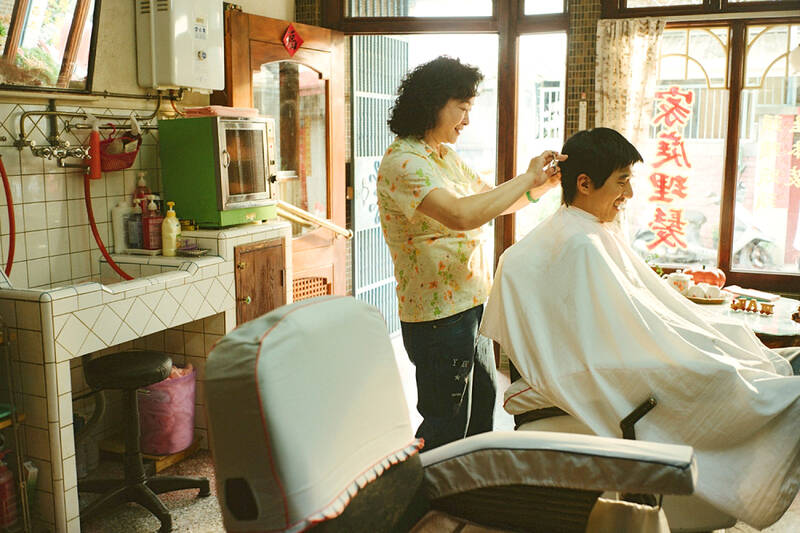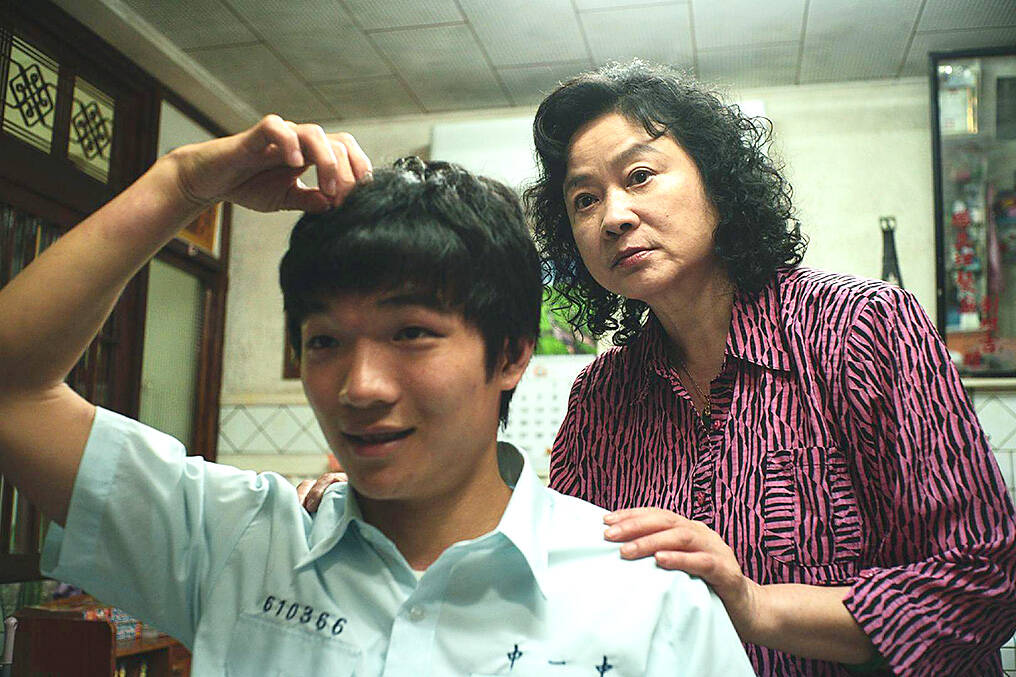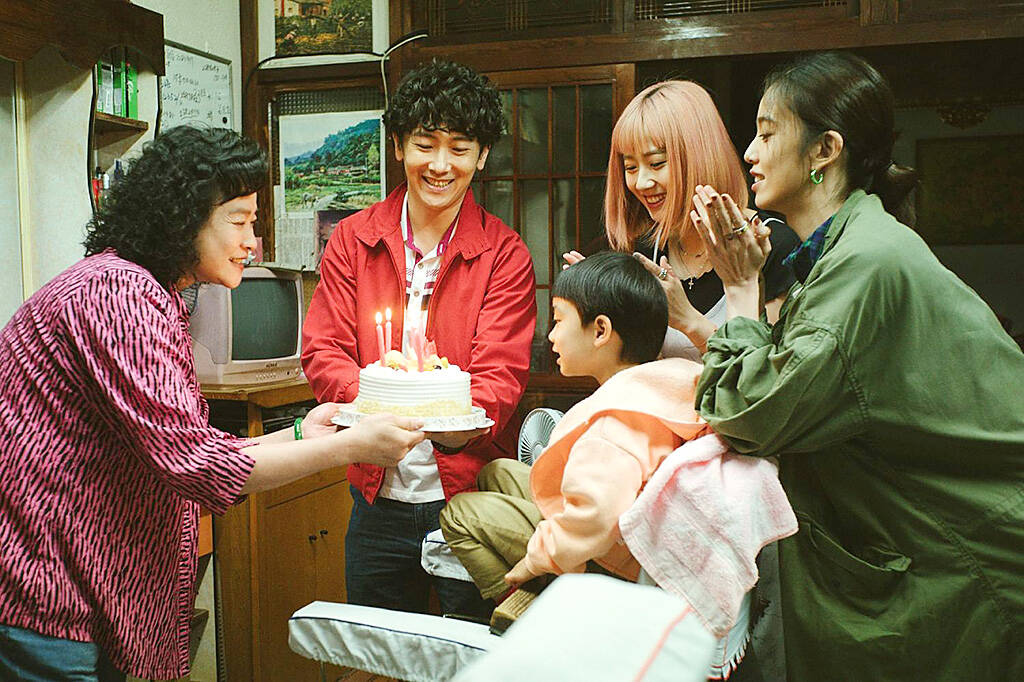During the 1980s, sex symbol Lu Hsiao-fen (陸小芬) was known for her bold behavior and suggestive performances. But in in Day Off (本日公休), her first film role in 23 years, Liu, 66, plays kind-hearted yet stubborn hairdresser A-Rui, who struggles with social and generational change.
Operating an old-school barber shop from her home, A-Rui has had the same customers for decades.
“You’re in charge of all of our heads,” one quips.

Photo courtesy of Vie Vision Pictures
A-Rui prides herself on knowing exactly what each customer wants without needing to ask, and her shop is also a place for locals to socialize. She personally calls each customer to remind them that it’s time for a haircut, and balks when her daughter A-Ling (Beatrice Fang, 方志友) — also a hairdresser — suggests an automatic scheduling notification app.
This story is based on director Fu Tien-yu’s (傅天余) experiences growing up in her mother’s hair salon. Many of the scenes actually happened, such as the old man who barged into the shop early in the morning to dye his hair black after dreaming of his dead wife scolding him about his appearance, or the teenager who was dragged back to the store by his angry mother after he got a trendy haircut to impress his girlfriend.
With decades of material to draw from, the slices of life in the salon and the way A-Rui runs it are vivid and humorous, providing an intimate peek into these establishments that can still be seen in older neighborhoods, but might not be around for much longer.

Photo courtesy of Vie Vision Pictures
Lu has turned down numerous movie roles over the years, but she says she was especially moved by this script. Having no hairdressing experience, she went through three months of training and also took acting classes to brush up on her skills.
Although Lu portrays A-Rui’s subdued but strong personality with nuance, the other characters in the film are one-dimensional, as if they exist just to highlight certain values. A-Rui’s rejection of modernity and insistence that customer relationships are more important than money is countered by the ambitious A-Ling, who plans to open an NT$100 salon that offers 10-minute, in-and-out services. She cannot believe that her mother is not charging extra to travel all the way to Changhua to cut the hair of a long-time customer who cannot move anymore.
A-Ling’s ex-husband A-Chuan (Fu Meng-po, 傅孟波), a mechanic, is like A-Rui, but he’s nice to a fault and keeps letting customers defer their payments for various reasons, even at one point lending his life savings to a friend in need. He also spends more time with A-Rui than the others — even though he and A-ling are divorced. People are usually more complex than this.

Photo courtesy of Vie Vision Pictures
Like the characters, the story itself is very straightforward and evenly paced, detailing a few transformative months in the family’s ordinary lives. It certainly has a lot of heart and offers a few laughs and tear jerking moments, but the plot and characters often come off as a motivational video for some forgotten past that probably never existed.
The biggest problem is the dialogue, which is too deliberate and moralistic. Cars and haircuts are often used as metaphors for the feelings of the characters, or to foreshadow subsequent events, which came of as unnatural.
The movie is still worth watching for Lu’s portrayal and the detailed depiction of a traditional establishment; it might even be the last time to see Lu on screen as she’s suggested in interviews that she is retiring for good.

April 14 to April 20 In March 1947, Sising Katadrepan urged the government to drop the “high mountain people” (高山族) designation for Indigenous Taiwanese and refer to them as “Taiwan people” (台灣族). He considered the term derogatory, arguing that it made them sound like animals. The Taiwan Provincial Government agreed to stop using the term, stating that Indigenous Taiwanese suffered all sorts of discrimination and oppression under the Japanese and were forced to live in the mountains as outsiders to society. Now, under the new regime, they would be seen as equals, thus they should be henceforth

Last week, the the National Immigration Agency (NIA) told the legislature that more than 10,000 naturalized Taiwanese citizens from the People’s Republic of China (PRC) risked having their citizenship revoked if they failed to provide proof that they had renounced their Chinese household registration within the next three months. Renunciation is required under the Act Governing Relations Between the People of the Taiwan Area and the Mainland Area (臺灣地區與大陸地區人民關係條例), as amended in 2004, though it was only a legal requirement after 2000. Prior to that, it had been only an administrative requirement since the Nationality Act (國籍法) was established in

With over 80 works on display, this is Louise Bourgeois’ first solo show in Taiwan. Visitors are invited to traverse her world of love and hate, vengeance and acceptance, trauma and reconciliation. Dominating the entrance, the nine-foot-tall Crouching Spider (2003) greets visitors. The creature looms behind the glass facade, symbolic protector and gatekeeper to the intimate journey ahead. Bourgeois, best known for her giant spider sculptures, is one of the most influential artist of the twentieth century. Blending vulnerability and defiance through themes of sexuality, trauma and identity, her work reshaped the landscape of contemporary art with fearless honesty. “People are influenced by

The remains of this Japanese-era trail designed to protect the camphor industry make for a scenic day-hike, a fascinating overnight hike or a challenging multi-day adventure Maolin District (茂林) in Kaohsiung is well known for beautiful roadside scenery, waterfalls, the annual butterfly migration and indigenous culture. A lesser known but worthwhile destination here lies along the very top of the valley: the Liugui Security Path (六龜警備道). This relic of the Japanese era once isolated the Maolin valley from the outside world but now serves to draw tourists in. The path originally ran for about 50km, but not all of this trail is still easily walkable. The nicest section for a simple day hike is the heavily trafficked southern section above Maolin and Wanshan (萬山) villages. Remains of